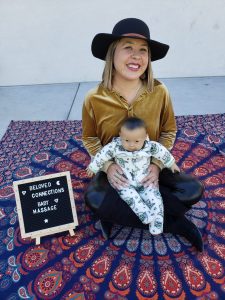Birth to age five is considered one of the most critical times in childhood. During this period, children experience the fastest levels of brain development, create the connections needed for empathy, learn social skills that come into play once they enter school, and pick up social norms. So what’s a parent to do when things aren’t going as planned? Allow me to introduce you to Liliana Montoya, who is a Holistic Parent Coach trained in Infant Mental Health. What is Infant Mental Health? It is a highly-specialized part of the mental health field that is specifically-focused on the growth and development of children birth to five years old. Montoya describes her role as “a support to families dealing with new-found behaviors.” She specializes in “the mental health component, the developmental component, and the social-emotional component all wrapped into one.” In addition to completing her degree in professional counseling, Montoya attended the Harris Institute at Southwest Human Development and completed a two-year certification program focused on Infant Mental Health and Family Studies.
Parents reach out to Montoya for a variety of reasons, but more recently parents have sought her services to help with the transition back to preschool/daycare, coping with anxiety related to reintroduction to social environments, and often just with general concerns about their children’s development. She is also able to assist families that have adopted or are fostering a young child. One of the advantages of working with an Infant Mental Health Specialist like Montoya is her ability to go into the child’s classroom to observe the behavior as it is happening.
“Doing a classroom observation is usually helpful because then I can observe what’s going on with the kiddo, it might be a developmental thing or perhaps it’s just how things are set up – or I’m noticing triggers that the kiddo encounters that the teacher may not be able to notice while leading a class.”
So what’s it like to work with an Infant Mental Health Specialist? On average, when doing classroom observations and write-ups, there are typically 1-3 sessions held with the family. Montoya’s write-ups include what she has observed and recommendations for the family going forward. For families going beyond an observation or write-up, such as those who are dealing with more intense behaviors or anxiety, the family will set up a plan with specific goals and Montoya will work with both the caregivers and the child. The length of this work can vary but can last up to a year depending on the issue. Her work is focused on strengthening the relationship between child and caregiver, and most importantly on fostering attachment.
Something unique to the work Montoya does is her use of baby massage. Montoya has been providing classes and workshops on baby massage at local yoga studios, parks, Musicology, and even at Wildlings Toy Boutique in Phoenix during their sensory playdate. “In the first three years, brain connections are going crazy and growing so fast,” says Montoya, “That is your blueprint for how you have relationships in your future as an adult.” Baby massage allows for parents and the child to work on attachment and bonding, and in terms of brain development, it increases oxytocin production for the baby. Therefore, baby massage not only helps strengthen the emotional bond between parent and child, but it also aids in the cognitive and developmental growth of the child. These baby massage classes are open to all.
Not sure if you need to reach out to an Infant Mental Health Specialist? Montoya states these are the top three reasons families seek her services:
- If your child is struggling with self-regulation, i.e. tantrums are lasting longer than normal or your child is inconsolable;
- If your child is struggling with separation from parents/caregivers, and it’s affecting their ability to attend preschool/daycare or engage in social situations; or
- If your child has experienced early childhood trauma and they are recreating it in their play or talking about it and/or have developed new fears and worries.
Montoya has also developed her own curriculum for expectant mothers to start working on the bonding and attachment with their children as early as possible. When asked what one thing she wants parents to know when it comes to infant mental health, she states, “Your mental health is your baby’s mental health.” She stresses the importance of taking care of yourself first in order to be able to have the emotional capacity to be present for your baby.
Want to learn more about Infant Mental Health or looking for support be sure to check out these resources for more information;
The Birth to Five Helpline Call the Helpline to speak with one of their bilingual (English/Spanish) early childhood specialists, Monday through Friday from 8:00 a.m. to 8:00 p.m, or text the Helpline 24 hours a day, seven days a week. 1-877-705-KIDS (5437)
The Harris Insitute at Southwest Human Development https://www.swhd.org/training/harris-infant-mental-health-certification/
Infant Toddler Mental Health Coalition of Arizona https://itmhca.org/
Phoenix Children’s Center for Perinatal and Infant Mental Health https://www.phoenixchildrens.org/centers-programs/center-perinatal-and-infant-mental-health


















